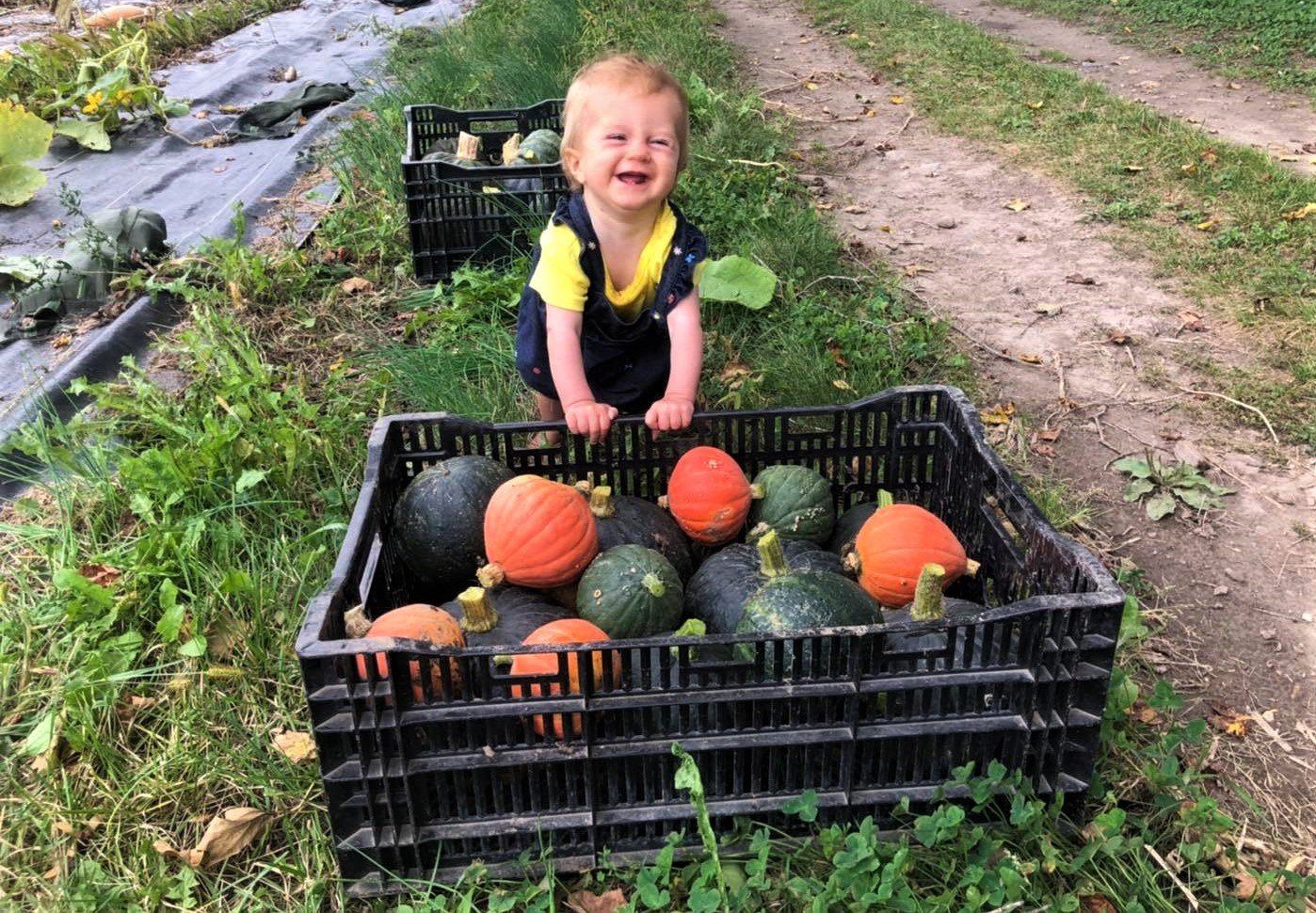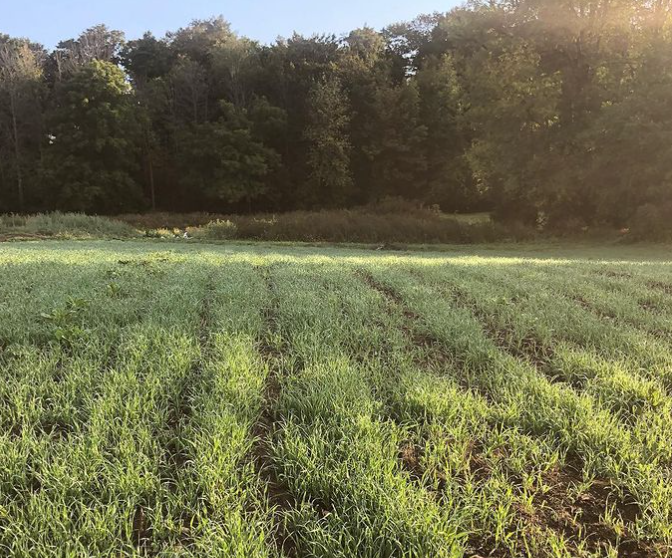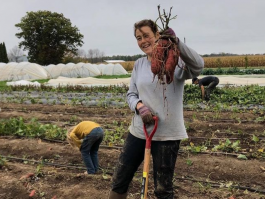October 14, 2021
The Lettuce Rejoice!
Firmly Rooted Farm's Newsletter for their Veggie Loving Farm-ily
.png)
On the Farm: Potato, Sweet Potato
Hello again my veggie loving friends,
October is one of my favourite months when the weather stays nice. The trees begin to show their “true” colours, in the absence of chlorophyll, and it’s the perfect weather for a light jacket. Not too hot, not too cold.
Another exciting harvest has occurred at the farm; the sweet potatoes have been dug! Nearly 3000 pounds of the delicious tuber were pulled from the fields and put in storage to cure for a couple of weeks. The curing process is necessary to get that sweet flavour, an uncured sweet potato would just taste starchy. The curing process breaks down starches into sugars, making them much more palatable. Did you know that yams and sweet potatoes are not the same things? They aren’t even in the same plant family. While yams are from the Dioscoreaceae family, sweet potatoes are from the Convolvulaceae family, the same family as morning glories!
At the farm, we are finishing up the last of our winter seeding and transplanting. This is a critical part of the year; if we don’t complete the plantings soon enough, the plants will not grow to our desired size due to lack of sunlight. All plantings center around the Persephone period, or the period when the day length is 10 hours long or less. For us, that period begins in mid-November and ends mid-February. Then we work back from there.
We plant crops to either harvest throughout the winter, or to overwinter and harvest in the spring. The crops we harvest throughout the winter are planted in late summer or early fall. The goal is to seed or transplant crops, so they are at least 75% mature by the time the day length is 10 hours long. The time necessary to achieve this is of course different for every plant, so it depends on what you’re growing.
Some crops we plant just in time for them to grow a little bit before we hit the Persephone period. These crops, such as carrots, then start growing again come mid-February and are ready for an earlier harvest than they would be if we had waited to plant in the spring.
We plant our winter crops in greenhouses and high tunnels, which protect them from the harshness of an Ontario winter. However, since we don’t heat our greenhouses, and high tunnels are not equipped to be heated, temperatures can drop low enough to freeze some vegetables. Certain crops are built to handle this. Salanova, kale, and spinach are examples of crops that can freeze solid and still be harvested after they’ve thawed out. The more tender crops, such as the sprouted carrots to be harvested in the spring, get covered in additional protection in the form of row cover, to insulate and protect them from freezing.
If you’d like to learn more about winter planting, check out Johnny Seed’s winter planting guide!
Kitchen Corner

I’ve said it before, and I’ll say it again; it’s soup season! Soup is an excellent way to use many storage vegetables, and there are tenets of a good soup. I find the best stocks are those which are homemade. Here are some chicken, vegetable, beef, and pork stocks with some excellent flavour suggestions and preparation tips. Mirepoix is a vegetable base of carrot, onion, and celery at a 1:2:1 ratio (or just make it up), popular as a base for many types of sauces in French cuisine, and many other cuisines have their variation of a vegetable base for soups. In Cajun food, you use bell peppers instead of carrots, known as the “Cajun Holy Trinity.” Protein is of course optional but cooking your beans or meat before adding to your soup reduces soup cooking time, and browning your meat adds a nice flavour. Salt is necessary, and I recommend ignoring the measurement suggestion in any recipe you’re following for soup and just season until your heart is content and your tongue is happy. Fat is necessary for sautéing the vegetables and carries flavour. Acid provides contrast against other flavours, heightening the flavour experience. Heat is necessary for cooking of course, but how much heat you use is just important; high to bring to boil, low to simmer. Seasonings like spices and herbs can be a final step, but not altogether necessary. However, they certainly help add complexity to a dish and convey regionalities, cultures, and stories. Here is a handy seasoning guide to help you put together the best flavour combinations.
Additionally, you can try puréeing for a beautiful velvety texture, and as a way to use “weird” winter veg like parsnips and kohlrabi. Sometimes, if the feeling is right, I’ll add honey or maple syrup to my soup to balance out any acidity or add complexity to the flavour. Soup is a feeling, so just go with it!
Kitchen Clean-Up
Lots of admin stuff this week, as our winter CSA is starting! A reminder to existing CSA members who also are getting a winter share: Starting the week of the 14th, Bayfield pick-up will be at Shopbike on Friday afternoons. Goderich market pick-up will be at an alternative location of your choice, either 44 Waterloo, Healthward Bound, Square Brew, or Akromold (employees only) on Thursdays.
For new CSA members, Harvie University can answer most questions you may have! Learn how to use credits, customize shares, change payments, change locations or reschedule a share, and much more. If you have any trouble, feel free to reach out to farmshare@firmlyrooted.ca
Finally, an update about the spray incident. We are still waiting to hear back from the Ministry of Environment (MoE), but the Ontario Ministry of Agriculture, Food, and Rural Affairs (OMAFRA) also took a sample that week and found “safe” levels of pesticide residue on the crops. This means that measurable levels of pesticide were present in the fields and on crops due to the incident, and we are therefore seeking legal action. We are however still waiting for further details from the MOE and will continue to update you as the situation evolves.
That’s all for now folks, happy eating until next time!
Farmer Erika




